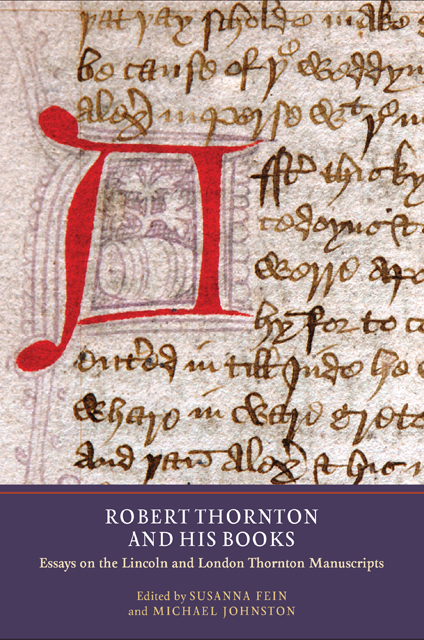Book contents
- Frontmatter
- Contents
- List of Illustrations
- List of Contributors
- Acknowledgements
- Abbreviations
- Introduction: The Cheese and the Worms and Robert Thornton
- 1 The Contents of Robert Thornton’s Manuscripts
- 2 Robert Thornton: Gentleman, Reader and Scribe
- 3 The Thornton Manuscripts and Book Production in York
- 4 The Text of the Alliterative Morte Arthure: A Prolegomenon for a Future Edition
- 5 ‘The rosselde spere to his herte rynnes’: Religious Violence in the Alliterative Morte Arthure and the Lincoln Thornton Manuscript
- 6 Constantinian Christianity in the London Thornton Manuscript: The Codicological and Linguistic Evidence of Thornton’s Intentions
- 7 Apocryphal Romance in the London Thornton Manuscript
- 8 Thornton’s Remedies and the Practices of Medical Reading
- Afterword: Robert Thornton Country
- Bibliography
- Index of Manuscripts Cited
- General Index
- York Medieval Press: Publications
8 - Thornton’s Remedies and the Practices of Medical Reading
Published online by Cambridge University Press: 28 February 2023
- Frontmatter
- Contents
- List of Illustrations
- List of Contributors
- Acknowledgements
- Abbreviations
- Introduction: The Cheese and the Worms and Robert Thornton
- 1 The Contents of Robert Thornton’s Manuscripts
- 2 Robert Thornton: Gentleman, Reader and Scribe
- 3 The Thornton Manuscripts and Book Production in York
- 4 The Text of the Alliterative Morte Arthure: A Prolegomenon for a Future Edition
- 5 ‘The rosselde spere to his herte rynnes’: Religious Violence in the Alliterative Morte Arthure and the Lincoln Thornton Manuscript
- 6 Constantinian Christianity in the London Thornton Manuscript: The Codicological and Linguistic Evidence of Thornton’s Intentions
- 7 Apocryphal Romance in the London Thornton Manuscript
- 8 Thornton’s Remedies and the Practices of Medical Reading
- Afterword: Robert Thornton Country
- Bibliography
- Index of Manuscripts Cited
- General Index
- York Medieval Press: Publications
Summary
Robert Thornton’s Lincoln manuscript, Lincoln Cathedral Library, MS 91, falls into three distinct sections, constituted respectively by romances and other narratives, moral and devotional materials, and medical and pharmaceutical knowledge. In the pages that follow, I consider the medical section of Thornton’s book. At present it consists of a Middle English remedy collection known as the Liber de Diversis Medicinis and six paper fragments that are the vestiges of a Middle English herbal in Thornton’s hand (arts. 99, 100). The inclusion of these two works of practical and therapeutic knowledge in Thornton’s book takes on its full significance only in light of late medieval trends in reading, writing and book production in England, especially the efflorescence of medical textuality. In the pages that follow, I place Thornton’s medical writings within this broader context to determine how they relate to contemporary genres of scientific and practical knowledge. I also seek to characterize how typical, or exceptional, was Thornton’s inclusion of a remedy collection and herbal alongside Middle English romances. Vernacular literature, like medicine, was a category in formation and in flux in the fifteenth century. Both discourses were reaching new readers and evolving to meet altered conditions of reception. Under what circumstances did they appear together, and what might this tell us about secular reading practices?
A third piece of medical writing in Thornton’s hand further aids me in answering these questions. A copy of John Lydgate’s versified regimen, the Dietary, survives imperfectly on fol. 97r–v of London, BL, MS Additional 31042 (Thornton’s London manuscript, art. 16). The poem is a close translation of the anonymous fifteenth-century Latin poem the Dietarium, itself based in part on the popular thirteenth-century medical poem the Regimen sanitatis Salernitanum, also known by the title Flos medicinae. While Thornton’s copy of Lydgate’s poem has been noticed and identified, it has not been considered in conjunction with the Liber de Diversis Medicinis – perhaps because Thornton’s scribal treatment of the Dietary assimilates it to the moralistic and didactic poems around it. Among the questions the latter part of this chapter will take up is whether categorizing the Dietary as a medical text is appropriate, and if so, what is to be gained from such a categorization.
- Type
- Chapter
- Information
- Robert Thornton and his BooksEssays on the Lincoln and London Thornton Manuscripts, pp. 235 - 256Publisher: Boydell & BrewerPrint publication year: 2014
- 2
- Cited by



